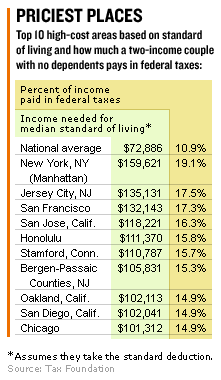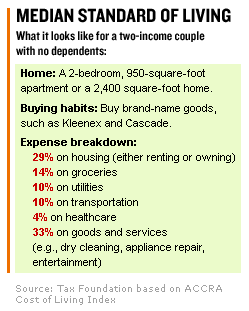NEW YORK (CNN/Money) � As if it's not expensive enough to live in places like Manhattan or San Francisco.
Well, guess what? The most costly areas of the United States may be even more expensive than you think, thanks to Uncle Sam's tax code.
At least that's one conclusion of a study released Thursday by The Tax Foundation, a nonprofit tax policy research group that advocates tax simplification measures including the flat tax.

According to the report, there is an added cost to being in high-priced areas that's not factored in when one considers the cost-of-living differences between two places: Federal income taxes.
While you may earn more in nominal terms in a high-cost area, doing so may throw you into a higher tax bracket and you would pay a higher percentage of your income to Uncle Sam. As a result, your after-tax income may actually have less purchasing power than it would if you lived in a lower cost, lower income area.
For example, a $160,000 income in Manhattan may in theory afford you the same standard of living as a $73,000 income in Milwaukee. But according to the Tax Foundation, if you lived in Gotham you'd pay 19.1 percent of your income to Uncle Sam, whereas in Milwaukee you'd pay only 10.9 percent.
The Tax Foundation looked at how a professional, dual-income couple with no dependents would fare in nearly 300 areas across 45 states and the District of Columbia.
Using data from ACCRA's Cost of Living Index, the Census Bureau and the IRS, the researchers calculated how much the couple would need to earn in each of the areas to enjoy the same purchasing power and standard of living provided by the national median income for a couple in their situation, which is $72,866. They then calculated what percentage of the couple's income would be paid in federal taxes. The national median couple pays 10.9 percent.
For simplicity's sake, they assumed the couple took the standard deduction on their federal return.
If the couple lived in Mobile, Ala., according to the report, they would need to earn only $65,452 to be able to enjoy the same standard of living provided by the national median income of $72,866 and they would pay 10.4 percent of their income in federal taxes.
By contrast, if they lived in Chicago they would need to earn $101,312 and they would pay 14.9 percent in federal taxes. If they moved to Manhattan, the priciest place of all, they'd need to earn $159,621 and would pay 19.1 percent to Uncle Sam.

If they were deciding between Boston and Atlanta, two cities of comparable size, they might opt for Atlanta, all things being equal. That's because in Boston, the couple would need to earn $100,364 to live as well as they would in Atlanta earning $71,356. But in Boston they would pay nearly 15 percent of their income in federal taxes, while in Atlanta they would pay only 10.7 percent.
Scott Moody, chief economist for the Tax Foundation, acknowledges that the discrepancies would be mitigated if you itemized your deductions. For instance, you'd probably have a much bigger mortgage living in Manhattan than you would in Topeka, so your mortgage interest deduction likely would be a lot higher and that would reduce the percentage of income you pay in taxes.
But itemizing won't necessarily remove the discrepancies altogether, Moody said, especially when you consider that the beneficial effects of many itemized deductions are removed when a taxpayer is subject to the Alternative Minimum Tax.
Taxpayers in high-priced areas who do take the standard deduction also may be penalized since the standard deduction and exemptions, like the federal tax brackets, are not adjusted for cost-of-living differences. As a result, Moody said, "the standard deduction is more valuable in Alabama than it is in New York."
The Tax Foundation does not consider the impact of state and local income taxes in its latest report, but you should if you're contemplating a move to another city or county, since state and local taxes can vary widely and both will have a direct effect on your take-home pay and purchasing power.
(To see more of the comparisons from the current Tax Foundation study, click here. And for a look at how state and local taxes can affect your bottom line and the latest list of the most tax-friendly states, click here.)

|

